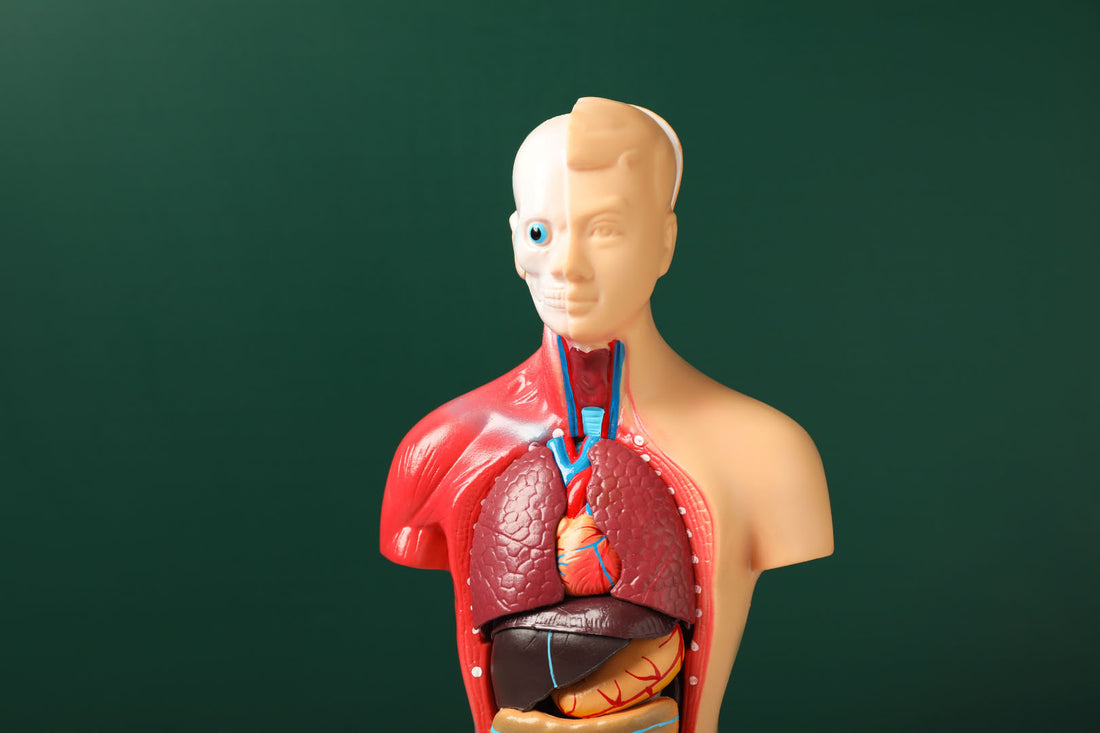In the endless turmoil of the wellness industry, the question comes up again and again: Can the human body actually over-acidify? This debate not only raises questions about dietary habits, but also takes a critical look at the role of foods and products that are supposed to balance the acid-base balance. This term is often repeated like a mantra in the wellness and health sector. But what is really behind it?
The acid-base balance: a central balance in the body
The acid-base balance, an intricate interplay of physiological processes, is of crucial importance for maintaining homeostasis, the balance of physiological functions, in the human body. It ensures, for example, the acidic or alkaline character of body fluids such as blood, tissue and cell interiors. Our body constantly strives to realise the necessary pH value in each of its areas.
Overall, the acid-base balance plays a decisive role in the smooth functioning of the human body. Maintaining this fine balance is essential not only for biochemical processes, but also for maintaining health and the optimal functioning of various organ systems. Therefore, an understanding of this physiological aspect is fundamental to promoting an informed and healthy lifestyle.
Important distinction: acidosis and nutritional hyperacidity
Acidosis and the nutritional acidosis of the body postulated in alternative medicine and the wellness sector are two different concepts relating to the body's acid-base balance. This article does not deal with acidosis, but with the alternative medical theory. Nevertheless, it is important to emphasise the differences at this point in order to avoid misunderstandings.
Acidosis
Definition: Acidosis refers to a pathological condition in which the pH of the blood falls below the normal range due to an excess of acids.
Causes: This condition can be caused by various medical problems, including respiratory problems, kidney failure or metabolic disorders.
Effects: Acidosis can cause serious health problems, including confusion, fatigue, breathing difficulties and even life-threatening complications.
Nutritional hyperacidity of the body
Definition: Alternative medicine often claims that certain foods, especially those considered "acid-forming," can cause the body to become acidic, even if the blood pH is within the normal range.
Causes: This concept is based on the idea that eating certain foods, such as meat, dairy products, sugar and refined foods, leads to an imbalance in the acid-base balance.
Effects: Supporters of this theory believe that dietary hyperacidity can lead to various health problems, including fatigue, digestive problems and increased risk of disease.
Hyperacidity: science or wellness fairy tale?
The concept of nutritional hyperacidity is often presented by alternative health practitioners as a key concept in promoting wellness and health. According to their interpretation, excessive consumption of foods considered to be acid-forming, such as meat, dairy products, sugar and refined foods, leads to increased acid production in the body. This is said to lead to hyperacidity and cause various health problems. Whilst this idea is widely held in alternative health circles, it is often considered unsubstantiated by the scientific community.
The human body is extremely efficient at regulating its acid-base balance, and the influence of diet on this process is controversial in conventional medical research. Many experts argue that a balanced diet rich in fruit, vegetables and wholemeal products is sufficient to keep the body in a healthy acid-alkaline balance, without the need for special diets to avoid supposedly acid-forming foods. In this sense, the idea of diet-induced acidosis remains more of a myth from the world of wellness than a scientifically based concept.
The scientific perspective: what does the research say?
The state of research on nutritional hyperacidity is rather meagre and characterised by a chronic lack of clear evidence. While some studies suggest that certain dietary habits can influence acid-base balance, there is no clear scientific basis for the widespread assumption that acidification of the body is caused by diet and triggers various health problems. Most researchers emphasise the extraordinary ability of the human organism to regulate the acid-base balance itself and argue that a balanced diet is sufficient to maintain a healthy balance. More comprehensive and high-quality studies are needed to draw more accurate conclusions and determine whether nutritional hyperacidity is a real medical challenge or rather a perception created by the wellness industry. It remains to be said that there is no serious evidence that there is such a thing as nutritional hyperacidity as a general phenomenon.
Alkaline diet: blessing or placebo?
Advocates of an alkaline diet claim that it can have a positive influence on the regulation of the acid-base balance. This diet emphasises foods that are considered alkaline, such as fruit, vegetables, nuts and some grains, while avoiding acid-forming foods such as meat, dairy products and certain grains. The idea behind this dietary philosophy is that it helps to maintain a slightly alkaline pH in the body, which is considered beneficial to health.
It is important to take a balanced perspective and consider the potential disadvantages of over-emphasising alkaline foods. An overly restrictive diet can lead to nutrient deficiencies, especially if important food groups are excluded. Before deciding on an alkaline diet, it is advisable to consider individual needs and the advice of nutritional experts. Overall, the debate about the effectiveness and sustainability of an alkaline diet remains a controversial topic that requires further research.
Products against hyperacidity: cure or hocus-pocus?
In a booming market characterised by a growing interest in holistic health, there are numerous products on offer that promise to deacidify the body. These range from special drinks and food supplements to ionised water devices. The idea behind these products is that they have a positive effect on the acid-base balance and thus lead to a better sense of well-being.
However, it is crucial to critically scrutinise these promises. The scientific evidence regarding the effectiveness of such products is often thin, if it exists at all. The human body is already equipped with highly developed mechanisms to regulate acid-base balance and it can usually adapt well to different dietary patterns. Many of these products can therefore be seen as marketing strategies to create awareness of the perceived need for de-acidification rather than actually providing demonstrable health benefits.
Consumers should be careful when choosing such products and realise that a balanced diet and a healthy lifestyle are the fundamental factors for a stable acid-base balance. Instead of relying on expensive products, it is advisable to focus on a varied diet and a healthy lifestyle to support the body's balance in a natural way.
Basically, we can only advise you to be very careful when someone presents you with a vague, supposed problem in order to sell you the solution immediately afterwards. Such an approach usually smells very much like a mere sales pitch.
Health risks and potential dangers
Even if one accepts that dietary acidosis is a real problem, the health risks remain the subject of controversy. The theory is that diet-induced acidosis could lead to a variety of health problems. One area that is often targeted is bone health. Some studies suggest that an acidic diet may be associated with slightly poorer bone health. This could be due to the body trying to compensate for excess acidity by releasing alkaline minerals such as calcium from the bones.
On the other hand, there is also research that indicates that the human body has efficient buffer systems to regulate the acid-base balance. The kidneys play a crucial role here by excreting excess acid. However, there are still many unknowns in this equation and it is difficult to define specific health risks for different organ systems.
It is important to emphasise that scientific research in this area is still in its infancy. Current evidence suggests that the effects of an acidic diet are often small and may be offset by a balanced diet. However, more comprehensive research is needed to better understand the exact relationships and consequences of the hypothetical hyperacidity on health. Until then, it is advisable to remain sceptical and focus on an overall balanced lifestyle. It is to be hoped that future scientific findings will provide more clarity as to whether hyperacidity in the body actually poses a serious health risk.
For everyday life, it means that if you suffer from certain symptoms, no matter what they are, you should always speak to a doctor to discuss causes and countermeasures.
Hyperacidity and heartburn
Many people think of heartburn when they think of hyperacidity. These are two different issues, although they are related to acid-base balance.
Hyperacidity refers to the idea that an acid load in the body caused by diet can lead to various health problems. On the other hand, heartburn is a specific symptom caused by the reflux of stomach acid into the oesophagus. This unpleasant burning sensation in the chest area can be triggered by various factors, including certain foods, obesity or a weakness of the lower oesophageal sphincter.
Although both phenomena are associated with acidity, they are not the same thing. While hyperacidity is a controversial theory, heartburn is a concrete symptom. With the latter, it is important to understand the underlying causes and seek professional medical advice to take appropriate action.
Facts and myths of hyperacidity
To summarise, the debate on dietary acidosis is a complex and controversial topic. While some alternative health practitioners and products claim that an over-acidified diet can lead to multiple health problems, the scientific community is sceptical and calls for more evidence-based research.
The idea of an alkaline diet to regulate acid-alkaline balance is supported by advocates who point to certain foods that are considered alkaline. However, there is limited scientific evidence to date on the direct effects of such a diet on health.
The booming market for products designed to de-acidify the body raises critical questions. Whilst some of these products could potentially have positive effects, caution is generally advised as they are often based on marketing strategies rather than solid scientific evidence.
It remains important to emphasise that the body's acid-alkaline balance is a highly complex system and any nutritional effects need to be considered carefully and based on sound scientific research. It is always advisable to seek professional medical advice if you have any health concerns.










